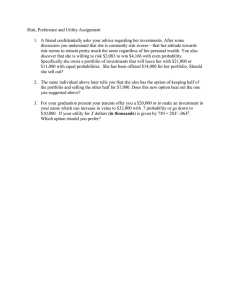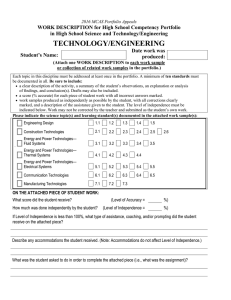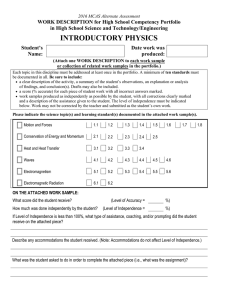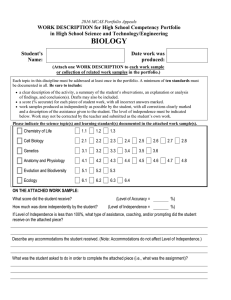PHILADELPHIA UNIVERSITY SYLLABUS iMBA -772
advertisement
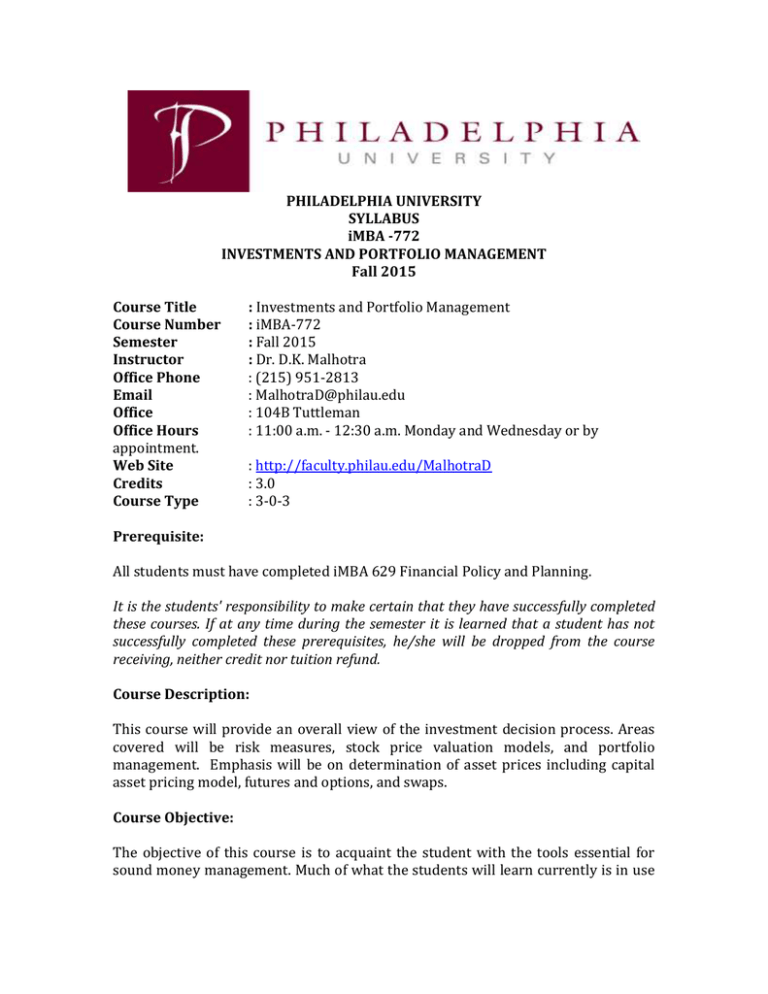
PHILADELPHIA UNIVERSITY SYLLABUS iMBA -772 INVESTMENTS AND PORTFOLIO MANAGEMENT Fall 2015 Course Title Course Number Semester Instructor Office Phone Email Office Office Hours appointment. Web Site Credits Course Type : Investments and Portfolio Management : iMBA-772 : Fall 2015 : Dr. D.K. Malhotra : (215) 951-2813 : MalhotraD@philau.edu : 104B Tuttleman : 11:00 a.m. - 12:30 a.m. Monday and Wednesday or by : http://faculty.philau.edu/MalhotraD : 3.0 : 3-0-3 Prerequisite: All students must have completed iMBA 629 Financial Policy and Planning. It is the students' responsibility to make certain that they have successfully completed these courses. If at any time during the semester it is learned that a student has not successfully completed these prerequisites, he/she will be dropped from the course receiving, neither credit nor tuition refund. Course Description: This course will provide an overall view of the investment decision process. Areas covered will be risk measures, stock price valuation models, and portfolio management. Emphasis will be on determination of asset prices including capital asset pricing model, futures and options, and swaps. Course Objective: The objective of this course is to acquaint the student with the tools essential for sound money management. Much of what the students will learn currently is in use in firms across the nation and other countries. Projects and case studies will be included to ensure better understanding of the subject matter. Required Text(s) and/or Supplies: Investments Analysis and Portfolio Management by Reilly and Brown, 10th Edition, Cengage Learning, ISBN-13: 978-1-133-62703-6. Additional Recommended Readings: The Wall Street Journal Barron's Business Week The Economist Additional readings outside the textbook will be assigned during the semester. Attendance: Attendance is mandatory. You are responsible for what is covered in the class and any absence on your part leaves you responsible for finding out what was presented in class. You will benefit a lot from the course by doing problems and reviewing concepts, which are covered in the class. Requirements: I. Attend class regularly 2. Do Class Assignments. 3. Study class notes prior to next class and come prepared to the class to participate actively in discussions. 4. Be able to take time pressure tests. 5. Be able to perform basic statistics. Course Outcomes: Upon course completion, students will be able to: 1. Demonstrate proficiency in analyzing the relationship between risk and return and its impact on investment decision making 2. Demonstrate proficiency in analyzing portfolio theory and asset pricing models. 3. Demonstrate the ability to analyze and value stocks 4. Demonstrate the ability to analyze and value options payoffs Overview of expectations for the course, including major assignments or projects: Assignments Weight Evaluates which Course Outcomes? HW Assignments (Each 16% assignment will be equally weighted) HW 1 Outcome 1 HW 2 Outcome 2 HW 3 Outcome 3 HW 4 Outcome 4 Mid-term Exam 25% Outcomes 1 and 2 Final Exam 30% Outcomes 3 and 4 Security Analysis Project 9% Outcomes 1, 2, 3, and 4 Portfolio Management 10% Outcomes 1, 2, 3, and 4 Class Participation 10% Outcomes 1, 2, 3, and 4 No makeup exams will be given. If you miss an exam due to an unavoidable reason, the grade on the missed exam will be transferred to the final exam. THE FINAL EXAM IS COMPULSORY AND COMPREHENSIVE. DO NOT EXPECT ANY SCALING ON THE GRADES. Security Analysis Project: The project must be completed and submitted to me by the due date. There will be no extension of the deadline for submission of the project. If you do not submit the project, you will not be assigned any grade for the course. If you submit the project late, you will be assigned one letter grade lower than the grade on the project. Academic Honesty: Students are expected to perform according to a code of academic honesty that prohibits cheating on tests and plagiarizing others' work. Violation of this code may result in failure of the course. Grading Policy: Letter Grade A AB+ B BC+ C CF Grade Points 4.00 3.67 3.33 3.00 2.67 2.33 2.00 1.67 0.00 Percent Allocated 93% or higher 90% to < 93% 87% to < 90% 83% to < 87% 80% to <83% 77% to <80% 73% to <77% 70% to <73% <70% Academic Integrity Academic integrity is a policy about ethical behavior at Philadelphia University regarding one’s intentions, decisions, and actions while conducting academic work. It includes values such as avoidance of the following: cheating; plagiarism; copying; the fabrication of information; and facilitating, or denying others access to information. It expects honesty and rigor in research, course work, writing and publishing. Academic Integrity is taken seriously in this course. Any student violating the University’s academic integrity policy will be subject to appropriate sanctions. The University’s complete academic integrity policy is available in the Academic Catalog and University’s Student Handbook. Academic resources, including information on citation and documentation for all written work, projects, and presentations, are also available on the Learning and Advising Center’s website: http://www.philau.edu/learning/writingguidelines.html. Policy on Lateness, Absences, Makeup Work In accordance with University policy, students are expected to attend class every day with all relevant required course materials and work. If you are absent from class, contact your faculty as soon as possible, preferably before the next class meeting. Students remain responsible for any missed work, for work completed in class and for work due and must arrange for that work to be delivered to the faculty on time. Serious illness, family emergencies, or other crises mean that students should contact the Dean of Students Office as soon as possible (215-951-2740) and follow up with a direct explanation to the faculty. Students are responsible for all work related to this class; however, faculty may (but are not required to) make some accommodation in terms of time of delivery and/or make-up exams for major tests. Please consult with your faculty and your academic advisor to determine whether you should withdraw from the course or request an incomplete grade in the case of serious illness or crises. Collection of Student Work for Assessment Philadelphia University is committed to providing excellent and innovative educational opportunities to its students. To help us maintain quality academic offerings and to conform to professional accreditation requirements where relevant, the University and its programs regularly examine the effectiveness of the curricula, teaching, services, and programs the University provides. As Philadelphia University sees appropriate, it may retain representative examples or copies of student work from all courses. This might include papers, exams, creative works, or portfolios developed and submitted in courses or to satisfy the requirements for degree programs as well as surveys, focus group information, and reflective exercises. Information on Digital Resources This course is available on blackboard at http://bb.philau.edu Academic Support Services: Gutman Library (www.philau.edu/library) Gutman Library is a gateway to a variety of information resources. The homepage of the library provides 24/7 access to online databases of articles, e-journal collections, e-books, and specialized information to support this course. The library building is wireless, has 80 available workstations (PCs and Macs), printers, scanners, and copiers; as well as individual and group study spaces. The following databases available in the library will be useful in this course: Standard and Poor’s NetAdvantage ABI/Inform and Business Source Premier Wall Street Journal Wall Street Journal – Asia, Financial Times New York Times Students can also contact the Reference Desk directly Reference@philau.edu for more specialized help in identifying sources, or stop by the Reference Desk when the library is open. The Learning and Advising Center (www.philau.edu/learning) The Learning and Advising Center provides one-on-one tutoring assistance for writing, study strategies, test taking, and specific Philadelphia University courses*. To make a tutoring appointment, students should stop by the Learning and Advising Center in Haggar Hall or call (215) 951-2799. Academic resources, including information on citation and documentation, note taking, and study strategies are available on the Center’s website. Technology Resources (http://www.philau.edu/OIT/) The campus is wireless. If you need a computer, Gutman Library and Search Hall have open access computers. For assistance with technology issues, students should contact the Technology Help Desk at (215) 951-4648 or send an email to helpdesk@philau.edu. . Disability Services (http://www.philau.edu/disabilityservices/index.html) Philadelphia University does not discriminate on the basis of disability, in accordance with the Americans with Disabilities Act and Section 504 of the Rehabilitation Act of 1973. The University makes accommodations for students with disabilities who seek accommodations in the classroom. All students interested in receiving accommodations must contact the Office of Disability Services by email at DisabilityServices@philau.edu, phone at (215.951.6830) or office visit. The office is located in Kanbar 102D. Students requesting accommodations in the classroom must present a current accommodation letter from the Office of Disability Services to the instructor, before accommodations may be made. Philadelphia University works with students with disabilities regarding equal access to all services and programs. Requests for accommodations may be made at any time (although accommodations are not retroactive). The University encourages all students who have any inquiries to contact Disability Services. Inclement Weather Policy To ensure the continuation of student learning in time of emergencies, including severe weather, it is the policy of Philadelphia University not to cancel classes. However, if on campus sessions are not possible, students are responsible for checking their university email and/or Blackboard for information regarding holding of classes through online adobeconnect. TENTATIVE COURSE OUTLINE: 08/25 Introduction to Investments o Meaning of Investment o Why people invest? o Why study investment and portfolio management? o Expected Return and Risk 09/01 Introduction to Investments o Dominant Investments o Selecting Investments in a Global Market 09/01 Types of Securities o Introduction to Investments and Security-Market Indicator Series 09/08 Securities Markets o How to trade securities? o Margin Trading o Short selling and Margin Trading 09/15 Introduction to Diversification and Portfolio Analysis o Meaning of Diversification o Significance of Diversification o Markowitz Diversification in mean-variance framework 09/22 Introduction to Diversification and Portfolio Analysis o Expected Return of a Portfolio o Risk of a Portfolio o The Concept of Portfolio Efficiency and Efficiency Frontier 09/29 Asset Pricing Models o The Characteristic Line and the CAPM o The concept of Systematic and Unsystematic Risk o The Characteristic Line o Capital Asset Pricing Model 10/06 Asset Pricing Models o How Characteristic Line leads to CAPM o Systematic Risk and the Concept of Beta o Characteristics of Beta MID-TERM EXAM 10/13 Arbitrage Pricing Theory 10/20 How to analyze common stocks? o Market Analysis o Industry Analysis 10/27 Analysis of Common Stocks o Company Analysis 11/03 Introduction to Valuation 11/10 Valuation of Common Stocks o Valuation of Common Stocks o Dividend Discount Models o Free Cash Flow Valuation Models 11/17 Introduction to Stock Options o Meaning of Options o Types of Options o Payoff of Options o Futures 11/24 Stock Options and Futures 12/01 Student Presentations Final Exam NOTE: This is only a tentative schedule. SECURITY ANALYSIS ASSIGNMENT MBA 772 INVESTMENTS AND PORTFOLIO MANAGEMENT FALL 2015 Due Date: November 24, 2015 You work as a junior analyst in the security analysis division of a major brokerage firm. Your boss in the security analysis division has asked you to conduct a detailed analysis of a company and prepare a detailed report on undertaking investment in that company’s shares. You should provide a recommendation that “YOU” think is correct and not what other “experts” think is correct. You must provide the name of the company that you want to analyze by September 1, 2015. You may not be able to change your company for your project after the initial selection. You must submit the project by the due date. If you do not submit the report by the due date, you will lose three points from the score for your project. If you choose not to do the project, you will receive an “F” in this course. You report should be organized along the following lines: FORMAT: 1. Your report should start with a clear-cut recommendation as to whether one should or should not buy the shares of the company. 2. Discuss each and every reason in detail. 3. Attach a copy of all your sources of information to substantiate your arguments. You must footnote and reference your sources of information in the report. Consult a Business Communications book for business report writing styles. Your report should not exceed ten pages (excluding supporting documents). Stock Portfolio Management One Million Dollar Philadelphia University Chair of Investments Objective: The objective of this $1 million portfolio is to be able to attract a senior faculty member with research and teaching expertise in the area of investments. Specifically, the fund must provide a $20,000 salary supplement, $20,000 secretarial assistant, and $10,000 travel budget per year. The fund also requires preservation of initial capital. Ground Rules: 1. Your portfolio shall not include more than 20 percent investment in bonds. 2. You are responsible for keeping track of all buying and selling. You may find it beneficial to store this information on a spreadsheet. 3. There is a $7 per trade transaction fee charged for both buying and selling for bonds and stocks. Assume no trading costs for U.S. Treasury bills. 4. Idle cash earns 0.5 percent per annum (compounded daily, 365 days a year). 5. Take over managing this portfolio on September 1, 2015. 6. Your report on the portfolio is due on every week and the final report is due on December 1, 2015 You may not trade on margin or short sell.
